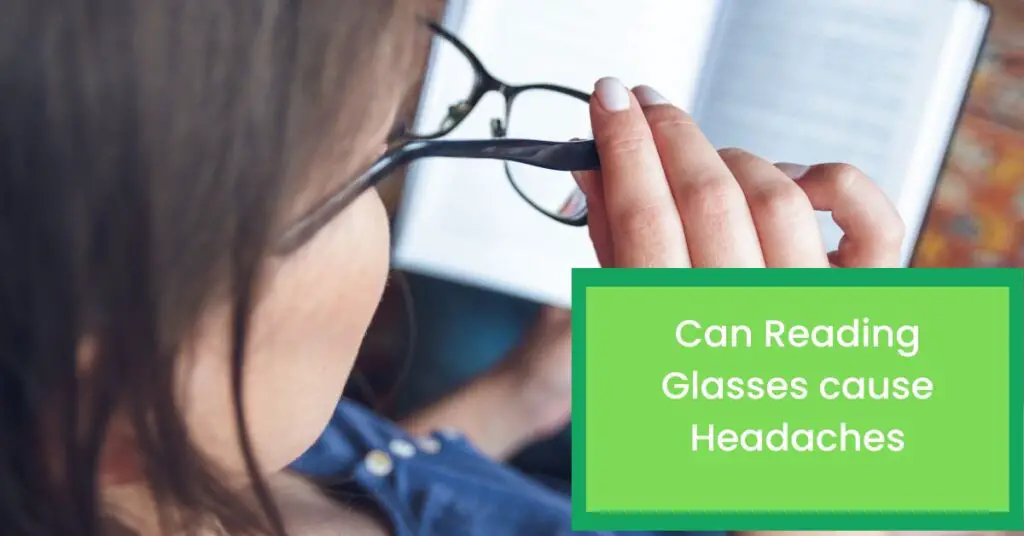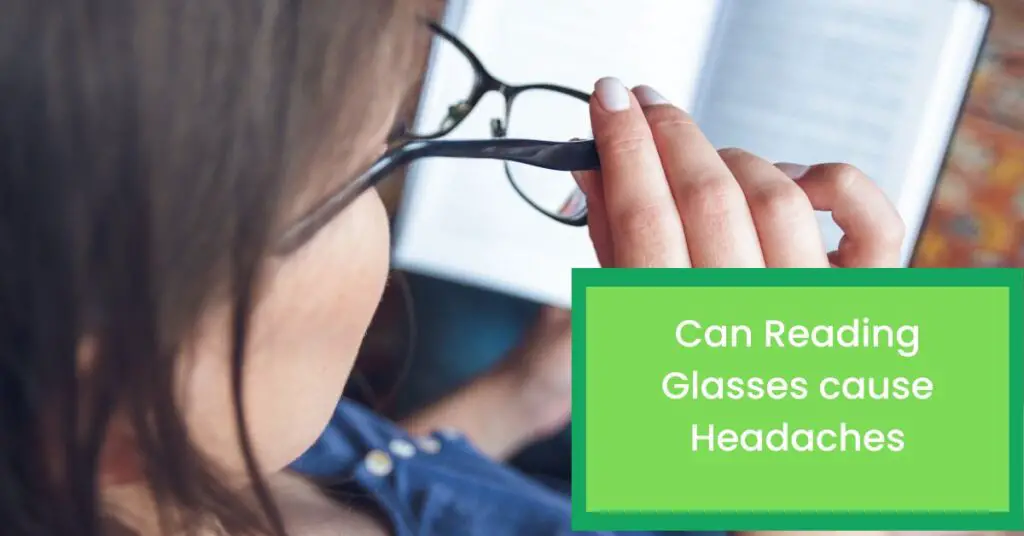Reading glasses are a common tool to help people with vision problems read better. However, some people who wear reading glasses may experience headaches. In some cases, the headaches may be caused by the glasses themselves.
The most common reasons why reading glasses may cause headaches. One reason is that the glasses may be too tight or too loose. If the glasses are too tight, they may put pressure on the temples and cause pain. If the glasses are too loose, they may move around on the face and irritate the skin.
Another reason why reading glasses may cause headaches is that they may not fit well with your prescription. If the lenses of your reading glasses are not made specifically for your eyes, they may cause eye fatigue and headaches.
Finally, reading glasses may cause headaches if you are not used to wearing them. If you are not used to wearing glasses, the muscles around your eyes may fatigue quickly. This can lead to tension headaches and migraines.
If you experience headaches after wearing reading glasses, there are several things you can do to alleviate the pain. First, make sure that the glasses fit well and are made specifically for your prescription.
If the glasses still cause pain, try taking a break from wearing them for a day or two. If the headaches persist, talk to your doctor about finding a pair of reading glasses that fit better and don’t cause as much head pain.
Overall, there is a chance that reading glasses can cause headaches. However, it is not a guarantee. If you are concerned about this, it is best to consult with an optometrist to determine the root cause and find a solution.
Reasons to Headache
– Lens Power: There are a number of factors that can contribute to headaches when wearing glasses, and lens power are one of them. If your glasses are too strong or too weak, it can cause eye strain which can lead to headaches.
It’s important to get an eye examination to make sure your prescription is correct, and if you’re still having headaches, it may be worth considering getting lenses with a slightly different prescription. Sometimes, simply changing the strength of your lenses can help alleviate headache symptoms.
– Eye Muscle Adjustments: Adjusting the muscles in your eyes to match the power of your glasses can cause headaches. This is because when you change the focus of your eyes, the muscles have to work harder to achieve that new focus.
Over time, this can cause tension and pain in the muscles. If you find that you’re getting headaches after adjusting to a new pair of glasses, it’s best to see an ophthalmologist or optometrist to determine whether the glasses are the right prescription for you.
– Pressure Points
Muscle: Muscles used to tense and then relax repeatedly, such as those around the eyes and scalp, can become tired and start to ache.
This is called a muscle-pressured headache. The most common type of muscle-pressured headache is one that affects the forehead, temples, or back of the head. It’s usually caused by stress, eyestrain, or poor posture.
To help prevent muscle-pressured headaches, be sure to get regular eye exams and use glasses if needed; take breaks during extended periods of close work. Avoid excessive straining when lifting weights, and use a good posture when sitting and standing.
If you already have a muscle-pressed headache, try gentle massage or relaxation techniques to help relieve the pain.
Nerves: For some people, the pressure on their nerves from new glasses can cause headaches. This is because the nerves are being compressed by the frames or lenses of the glasses.
If you’re experiencing headaches from your new glasses, it’s important to take steps to relieve the pressure on your nerves. You can do this by adjusting the fit of your glasses or by using a headset or beanie to distribute the pressure more evenly.
If the headaches continue, it’s best to see an optometrist to find a pair of glasses that fit more comfortably.
– Wrong Prescription: It is possible for an incorrect prescription for glasses to cause headaches. This is because the eyeglasses are not providing the correct level of correction for your vision, which can place strain on your eyes and cause headaches.
If you find that you are frequently getting headaches after wearing your new glasses, it is important to see an optometrist or ophthalmologist check your prescription and make sure that it is accurate.
Additionally, make sure to give your eyes a break from time to time by taking off your glasses and resting them. You may also want to try using computer glasses or blue light blocking glasses to help reduce digital eye strain if you spend a lot of time looking at screens.
– Digital Eye Strain: It’s possible that digital eye strain through glasses can cause headaches. When you’re looking at a digital screen, you’re typically looking at something that’s emitting light in a very specific way – it’s usually blue and green.
That kind of light is harsher on your eyes than the kind of light you’d see in the natural world, which is why a lot of people find themselves getting headaches or feeling tired after looking at screens for extended periods of time.
Wearing glasses that filter out some of the harsh blue and green light can help alleviate some of those symptoms. So if you find yourself struggling with headaches or fatigue after using screens, it might be worth trying out a pair of computer glasses to see if that makes a
Avoid the Headache
– Give your eyes the needed rest:
It’s definitely a good idea to give your eyes a break if you’re starting to feel a headache coming on. The best way to do this is by taking a few minutes to relax and focus on something far away.
This will help to rest your eyes and hopefully alleviate the headache. Additionally, make sure that you’re drinking enough fluids throughout the day, and try to avoid staring at screens for too long.
– Pick the most comfortably fitting frames at once:
There are a few things to keep in mind when picking out the most comfortable frame for your glasses. First, you want to make sure the frame is fitting properly.
This means that it should sit squarely on your nose and not slide down. If the frames are too loose, they will constantly require readjusting, which can lead to headaches.
Second, pay attention to the weight of the glasses. Heavier frames can put a strain on your nose and cause discomfort. Third, consider the materials that the frames are made out of.
Some people find that plastic or metal frames are more comfortable than wood or horn frames. Lastly, make sure you try on different pairs of glasses before making a decision. What feels good to one person may not feel good to another.
– Gradually familiarise with glasses:
Yes. Wearing glasses gradually will help reduce headaches. When you first start wearing glasses, your eyes may feel tired or strained. This is because your eyes have to adjust to seeing clearly through the lenses.
Give your eyes time to get used to the new prescription by wearing your glasses for gradually longer periods of time each day. Within a few days or weeks, you should notice that your eyes feel less tired and strained.
You may also find that you no longer get headaches as often. If you still experience headaches after wearing your glasses for a while, be sure to talk to your optometrist about possible causes and solutions.
– Never use the old glasses:
It’s possible that your old glasses are the cause of your headaches. When you wear the same pair of glasses for a long period of time, the tension on the bridge of your nose can increase, which may lead to headaches.
If you’re experiencing regular headaches, it’s a good idea to visit your optometrist to get a new prescription. And if you don’t want to spend money on a new pair of glasses, you could try using contact lenses instead. Contact lenses help relieve pressure on the bridge of your nose and may help reduce the frequency and severity of your headaches.
– Use it only as per the doctor’s recommendation:
You might find that your headaches are reduced if you use glasses only as recommended by your doctor. A lot of people suffer from headaches, and they can be caused by a variety of factors, such as eyestrain, environmental allergies, and even diet.
If you’re experiencing regular headaches and have been told by your doctor that you need to wear glasses, then following their recommendations is the best way to see if your headaches improve.
It’s also important to make sure that your glasses prescription is up-to-date and that you’re wearing the correct type of glasses for your needs. Talk to your eye doctor about any concerns or questions you have regarding eyeglasses and headache relief.
Overexposure to Flames & Bright Lights Bad for Eyes
We all know that looking at the sun for too long can be bad for our eyes, but what about other forms of overexposure?
Exposure to bright lights and flames can be just as damaging to our eyes as looking at the sun. The brightness of these light sources can cause a condition called photokeratitis, which is basically an inflammation of the cornea. This condition can be very painful and may cause temporary vision problems.
Flames produce intense heat that can cause damage to the surface of our eyes. This type of damage is known as a thermal burn, and it can lead to blindness if not treated properly.
So, what can we do to protect our eyes from these dangers?
Well, one thing we can do is to make sure that we wear appropriate eye protection whenever we are in a situation where there is a risk of overexposure. This includes wearing sunglasses when we are outside and safety goggles when we are working with flames or bright lights.
It’s also important to be aware of the risks associated with overexposure and to take steps to avoid these risks whenever possible. So, next time you’re out enjoying the summer sun, make sure to wear your sunglasses and stay safe!
Visual Explanations
i. Types of Headaches:
ii. Wrong Eye Prescription:
ii. Wrong Eye Prescription:
iii. Headache When Reading? :
Related Matters
Can wearing new prescription glasses cause headaches?
Yes, wearing new prescription glasses can cause headaches as your eyes adjust to the new prescription. This is a common occurrence and should subside as you get used to the new glasses.
How do I prevent headaches from new glasses?
To prevent headaches from new glasses, ensure that your prescription is up to date and accurately reflects your current vision needs. It’s also important to give yourself time to adjust to the new prescription.
How long does it take to adjust to new prescription eyeglasses?
It can take a few days to a couple of weeks to adjust to new prescription eyeglasses. During this time, you may experience mild headaches or discomfort as your eyes get used to the new lenses.
Why do new glasses give me a headache?
New glasses can give you a headache as your eyes adjust to the new prescription and the change in visual perception. This adjustment period can cause mild headaches, but they should diminish as you get accustomed to the new glasses.
Can glare from new glasses cause headaches?
Yes, glare from new glasses can contribute to headaches and eye strain. If you’re experiencing this issue, consider discussing anti-glare options with your eye care professional to minimize discomfort.













